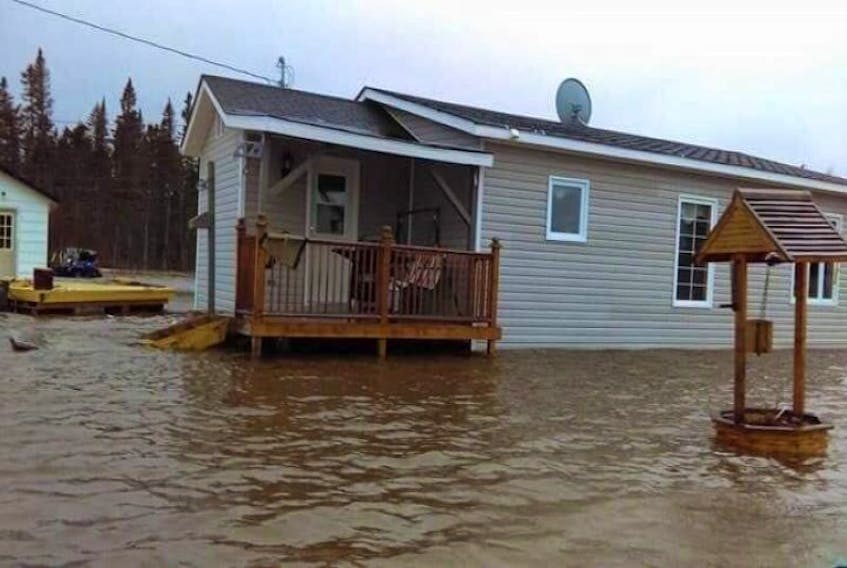A report released in August on flood-risk mapping the Mud Lake and Happy Valley-Goose Bay area has some residents in Mud Lake concerned, the local MHA says.
Lake Melville MHA Perry Trimper quite publicly brought up the report and the need to move on it quickly in the House of Assembly on Dec. 10, causing a bit of furor when he held up legislation on unlocking pensions. Trimper said he had asked for a chance to speak on Mud Lake and when it didn’t happen, he had to no choice.
Trimper said he felt, and feels, action needs to be taken on it now, and was concerned that if it wasn’t brought up then it would be pushed into the new year, which may bring another election, delaying the implementation of any of the recommendations.
“I was afraid we’d go through another winter and another spring breakup and wouldn’t get the attention the conclusions of this project require,” he said. “There are many issues at play.”
He’s also concerned that if another election is called in the new year the issue could get lost and have to go through another administration and more ministers.
“I’m trying to get a commitment on this for the people,” he said. “They’ve gone through quite a bit of trauma. Going through what they went through in 2017, no one wants to face that again.”
The report, titled "Climate Change Flood Risk Mapping Study and the Development of a Flood Forecasting Service: Happy Valley-Goose Bay and Mud Lake," came about after a flood in May 2017 that saw a significant amount of damage to the small community of Mud Lake and parts of Happy Valley-Goose Bay.
An independent assessment of the flooding commissioned by the province showed that the flood was due to a combination of natural causes.
Emergency disaster relief helped repair many of the homes that were damaged, but Trimper said some residents were afraid to move back and this report hasn’t helped with those fears.
He said there has been a river-watch committee created that has government officials, members of the public and scientists on board, and there is now enhanced real-time monitoring of the river, but it doesn’t do anything to protect the homes at risk.
The report showed that a number of buildings in both communities are likely to flood — up to 66 buildings in ice-affected floods under climate change conditions, the worst case scenario. It recommends that “flood mitigation measures be investigated and implemented to better protect the affected buildings from flooding on the river.”
“Flood mitigation measures will help to reduce flood damages and improve the safety and well-being of the residents,” the report reads.
The report clearly shows that some homes will flood again within the next 20 years, Trimper said, and people who live in those areas are worried.
He met with residents of Mud Lake on Dec. 21 to put the options before them and to see what they would like to do. Ideally, he said, there would be financial aid to move some of the homes to areas less likely to flood, as was done in Badger, but that option isn’t available.
“To get people out of harm’s way we have to either move them or look at mitigation strategies like berms and elevating structures so they're above flood lines,” he said.
He said some residents want to stay and some want to go, but he stressed it has never been about relocating the entire community. There are people who will never leave the community, Trimper said, and he understands and supports that.
“Bottom line is, if they’re going to stay there, they need more protection than they have now,” he said. “We need to either provide financial or other support to help them move or help them be safer than they are now. We cannot ignore them.”
SaltWire Network contacted the Department of Environment, Climate Change and Municipalities and was told there is no program to provide assistance to residents in relation to anticipated flooding in a community and the department has not received a formal request under the community relocation policy.
A statement by the department said there are examples of properties located in flood-risk zones throughout the province, and “work has been undertaken to better prepare for such events through enhanced flood-risk modelling and mapping.”
When asked if the minister planned to meet with the residents who are affected, the department said Trimper and the minister, Derek Bennett, have been in contact with them.
“The minister has indicated that he will look into any request from the community, and is waiting for follow-up from the MHA,” an emailed statement read. “A meeting can be arranged either in person or virtually pending COVID-19 guidelines and public health advice on travel at that time.”
Evan Careen is a Local Journalism Initiative reporter covering Labrador for SaltWire Network.









